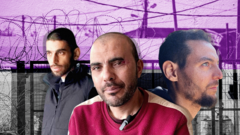Recent testimonies from released Palestinian detainees illustrate alarming cases of torture, including chemical burns and electric shocks, in Israeli custody. Despite Israel's denials, these allegations align with prior reports from human rights organizations.
Human Rights Violations: Gazan Detainees Report Torture and Abuse in Israeli Facilities

Human Rights Violations: Gazan Detainees Report Torture and Abuse in Israeli Facilities
Palestinian detainees recount horrific experiences of mistreatment, torture, and abuse in Israeli detention centers, raising concerns of potential violations of international law.
---
Palestinian detainees returning to Gaza have detailed harrowing accounts of abuse and torture inflicted by Israeli military and prison personnel. In interviews with BBC reporters, individuals highlighted experiences of chemical burns, physical assaults, and electric shocks, underscoring a concerning pattern of mistreatment within Israeli detention frameworks.
Mohammad Abu Tawileh, a 36-year-old mechanic, recounted his torture experience, describing how he was subjected to chemical burns after being doused with cleaning agents. He said soldiers ignited his back with a lighter, causing excruciating pain as he flailed desperately to extinguish the flames. This year, he and several others were arrested in Gaza during Israel's aggressive military response to attacks by Hamas and other factions that resulted in significant casualties.
The released detainees reported that their detentions were often justified under Israel's Unlawful Combatants Law, allowing for indefinite arrest without charges for individuals deemed security threats. Despite the overarching accusations of links to Hamas during their interrogations, all subjects of this report were found not to have participated in the initial October 7 attacks that prompted their arrests.
Each detainee described being stripped, blindfolded, and subjected to severe beatings starting from the moment of their capture. They were frequently deprived of basic medical care, food, and water – living conditions that led to further health complications. The Israeli Defense Forces (IDF) responded to these allegations by denying the systemic abuse. The IDF stated that cases raised would be considered by relevant authorities while emphasizing its commitment to humane treatment practices.
Legal expert Dr. Lawrence Hill-Cawthorne noted that the treatment described by the detainees could qualify as torture under both international law and Israeli regulations. His analysis highlights that the abuse of detainees remains a critical issue that must be addressed by international entities.
As these detainees returned to Gaza, testimonies from other released individuals corroborated their experiences, revealing a broader narrative of oppressive treatment in Israeli detention facilities. Reports from established human rights organizations echo these accounts, citing severe human rights abuses, including sexual violence against detainees in institutions like Ketziot prison.
Upon their release, many detainees exhibited signs of malnutrition and untreated medical conditions – findings consistent with previous reports on the dire health situations in these facilities. The International Committee of the Red Cross has expressed ongoing concerns regarding the treatment of detainees, stressing the need for access to those still detained.
The revelations of these abuses prompt calls for greater oversight and adherence to international humanitarian laws in conflict scenarios, highlighting the urgent need for accountability and humane treatment for all detainees, regardless of context. The struggle for dignity and justice continues for the affected individuals and their communities, as they navigate the aftermath of trauma experienced in detention.
Palestinian detainees returning to Gaza have detailed harrowing accounts of abuse and torture inflicted by Israeli military and prison personnel. In interviews with BBC reporters, individuals highlighted experiences of chemical burns, physical assaults, and electric shocks, underscoring a concerning pattern of mistreatment within Israeli detention frameworks.
Mohammad Abu Tawileh, a 36-year-old mechanic, recounted his torture experience, describing how he was subjected to chemical burns after being doused with cleaning agents. He said soldiers ignited his back with a lighter, causing excruciating pain as he flailed desperately to extinguish the flames. This year, he and several others were arrested in Gaza during Israel's aggressive military response to attacks by Hamas and other factions that resulted in significant casualties.
The released detainees reported that their detentions were often justified under Israel's Unlawful Combatants Law, allowing for indefinite arrest without charges for individuals deemed security threats. Despite the overarching accusations of links to Hamas during their interrogations, all subjects of this report were found not to have participated in the initial October 7 attacks that prompted their arrests.
Each detainee described being stripped, blindfolded, and subjected to severe beatings starting from the moment of their capture. They were frequently deprived of basic medical care, food, and water – living conditions that led to further health complications. The Israeli Defense Forces (IDF) responded to these allegations by denying the systemic abuse. The IDF stated that cases raised would be considered by relevant authorities while emphasizing its commitment to humane treatment practices.
Legal expert Dr. Lawrence Hill-Cawthorne noted that the treatment described by the detainees could qualify as torture under both international law and Israeli regulations. His analysis highlights that the abuse of detainees remains a critical issue that must be addressed by international entities.
As these detainees returned to Gaza, testimonies from other released individuals corroborated their experiences, revealing a broader narrative of oppressive treatment in Israeli detention facilities. Reports from established human rights organizations echo these accounts, citing severe human rights abuses, including sexual violence against detainees in institutions like Ketziot prison.
Upon their release, many detainees exhibited signs of malnutrition and untreated medical conditions – findings consistent with previous reports on the dire health situations in these facilities. The International Committee of the Red Cross has expressed ongoing concerns regarding the treatment of detainees, stressing the need for access to those still detained.
The revelations of these abuses prompt calls for greater oversight and adherence to international humanitarian laws in conflict scenarios, highlighting the urgent need for accountability and humane treatment for all detainees, regardless of context. The struggle for dignity and justice continues for the affected individuals and their communities, as they navigate the aftermath of trauma experienced in detention.




















